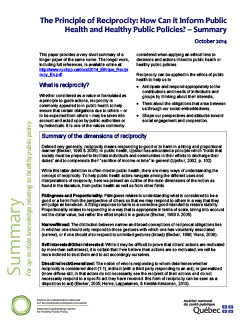The Principle of Reciprocity: How Can it Inform Public Health and Healthy Public Policies? – Summary
This paper provides a very short summary of a longer paper of the same name. The longer work, including full references, is available online at:
http://www.ncchpp.ca/docs/2014_Ethique_Reciprocity_En.pdf.
Whether considered as a value or formulated as a principle to guide actions, reciprocity is commonly appealed to in public health to help ensure that certain obligations due to others – or to be expected from others – may be taken into account and acted upon by public authorities or by individuals. It is one of the values commonly considered when applying an ethical lens to decisions and actions linked to public health or healthy public policies.
Reciprocity can be applied in the ethics of public health to help us to
- Anticipate and respond appropriately to the contributions and needs of individuals and groups by thinking about their interests,
- Think about the obligations that arise between us through our social embeddedness,
- Shape our perspectives and attitudes toward social engagement and cooperation.


